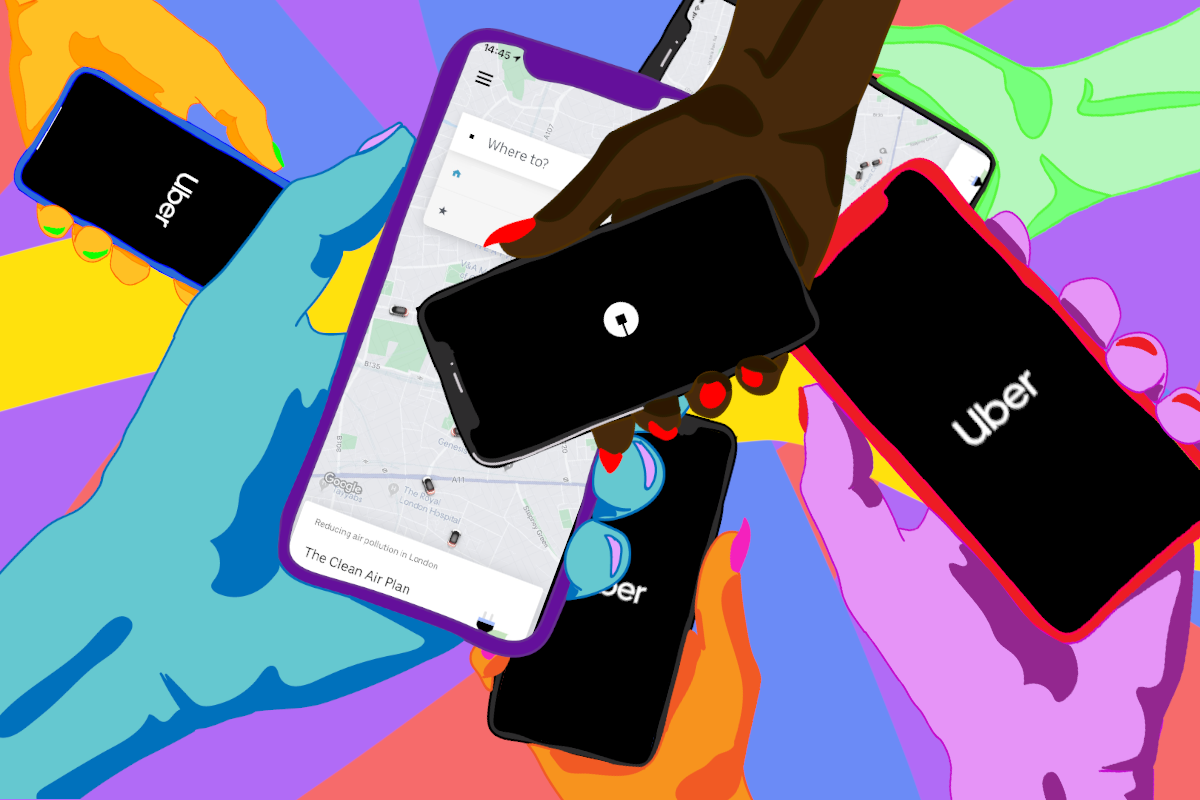
Illustration by Mariel No
Hundreds of drivers for Uber, the global ride-sharing app, are striking today across the UK over failures to resolve pay issues. The strike coincides with Uber’s upcoming sale of its shares on the stock market for the first time, commonly referred to as its “IPO” (Initial Public Offering). Practically, having an IPO means the potential to bring lots of money into the company, to enable its continued growth and expansion. Various sources have suggested that the company could be valued at $84bn after flotation – an astronomical figure, considering indications that Uber’s drivers earn an average hourly wage of £5, and must work up to 30 hours a week before breaking even.
The Independent Workers of Great Britain (IWGB) union’s United Private Hire Drivers (UPHD) branch has asked Uber users not to cross the “digital picket line” by not opening the app between 7am and 4pm. Drivers have issued a list of demands which include: a fare increase of £2 per mile; a 10% reduction in the commission Uber takes out of drivers’ earnings; and calling on Uber to confirm “worker status” for drivers, to enable an end to unfair dismissals and obliging Uber to respect the rulings of Employment Tribunals.
The Uber driver strikes in the UK follow in the wake of strikes by Lyft drivers last month in the US, following the company’s flotation on the stock market. Lyft was the first ride-hailing app to “go public”, and launched its IPO with a valuation of $30bn. As with the Uber strikes, Lyft drivers protested poor conditions and a lack of recognition of their worker status. The issue of worker status has long been contested by ride-sharing companies, whose business models rely on denying their workers access to basic labour rights.
“Judgements from Employment Tribunals have evidenced that many Uber drivers’ take-home earnings do not meet minimum wage requirements”
Last year, Uber went toe-to-toe with its own drivers when it attempted to defend categorising workers as “independent contractors”, a position that restricts worker’s entitlement to any form of rights and protections from an employer. In the past three years, judgements from the UK’s Employment Tribunals have evidenced the poor working conditions of Uber drivers, many of whose take-home earnings do not meet minimum wage requirements. In 2018 a Court of Appeal ruling was upheld, meaning that drivers will be entitled to basic worker’s rights such as minimum wage and holiday pay. The ruling followed a strike organised by the UPHD, alongside the occupation of the lobby of Uber’s London headquarters by UberEats couriers and Uber drivers.
IWGB UPHD branch secretary Yaseen Aslam sees Uber’s upcoming IPO as especially galling for drivers who are working long shifts and struggling to make ends meet. “[Uber] has progressively driven down pay and conditions in the minicab sector,” he explains. “A handful of investors are expected to get filthy rich off the back of the exploitation of these drivers on poverty wages. We are protesting today demanding that the company pay drivers a decent wage.”
UberPeople, an unofficial forum for ride-sharing drivers, provides examples of the impact of driving for long hours on their health and wellbeing.
Last month, one contributor wrote: “As someone with herniated discs, I can tell you sitting cramped in a car will make your back worse and your health-related expenditures will go up, making your driving profits even more minuscule”. Elsewhere on the site, contributors swap tips for managing “crushing” back pain from long driving shifts, ranging from using CBD oil, ice packs, anti-inflammatory medication, synthetic opioids, lumbar support cushions, stretching exercises, and simply “sleeping on the floor”. It seems that whilst Uber’s profits are set to skyrocket as investors’ bank balances soar, their workers are absorbing the seismic impacts of a business model premised upon exploitation.
Uber has also faced criticism for “aggressive business practices”, including a spate of sexual harassment investigations in its offices, consistent efforts to sidestep regulation, and a battle to renew its license in London after sexual assault allegations exposed a lack of robust processes to vet drivers. In 2016, a Freedom of Information Act request made by The Sun revealed that 32 rape allegations had been made against drivers in the past year in London; in response Transport for London (TfL) threatened to cancel Uber’s license in the city whilst it continued to shirk corporate responsibility.
“For many Uber users, particularly queer, trans and intersex people of colour, the app provides a vital lifeline for navigating the city we live in”
These incidents underline the need to reinforce well-regulated working practices and processes, and to secure rights for drivers, so that ride-sharing apps can operate as safely as possible. For many Uber users, particularly queer, trans and intersex people of colour (QTIPoC), the app provides a vital lifeline for navigating the city we live in. In recognition of this, last year Pxssy Palace, whose club nights prioritise womxn and femmes of colour and other QTIPoC began offering free taxis home from their events for trans femmes of colour.
London-based artist and gal-dem astrologer Marissa Malik explains: “I consistently rely on Uber because it provides a (safer) travel option on nights out, where I know the reception of my gender presentation positions me in more danger as a small, femme presenting person of colour”. Marissa expresses her support for the Uber strike, emphasising that solidarity with workers has to extend beyond daily convenience.
Delia Kim, a London-based event manager, also emphasises that Uber has had a huge impact on her sense of mobility and freedom. “I personally use Uber for safety,” she confirms. “Before Uber, I remember having to walk home at night and feeling so scared about being followed home that I’d sometimes opt out of certain social events.” Delia is also concerned that Uber’s business model is unsustainable for drivers. She tells me: “I’ve spoken to drivers who are paid so little they have to work unsafe, lengthy shifts throughout the night. This means the Uber is encouraging an unsafe service and paving the way for accidents”.
Today’s strikes occur in the context of a rapidly expanding gig economy. With increased amounts of workers on zero-hours contracts and in precarious work – both workforces which people of colour are disproportionately represented in – these protests draw a line in the sand. As Britain looks set to crash out of the European Union, an institution which for all its ills has historically paved the way for labour laws, real questions are being asked about the future of worker’s rights in the UK.
The answers are straightforward: unionised workers are setting the tone for ongoing discussions about the working conditions we all deserve. Through working long shifts, and in some cases to the detriment of their health, Uber drivers have created the company’s considerable wealth; securing basic rights and protections are only a starting point in this ongoing struggle.









